What's It Like to Be in the Bubble? Comfortably Numb.
IRVING, Texas — Joe Kelly and Joey Wendle met in the sixth inning of World Series Game 2 Wednesday night and again about 12 hours later in the lobby of MLB’s official “bubble” hotel. The Dodgers pitcher and Rays third baseman may be enemy combatants, but their happenstance encounter in the lobby was that of two regular Joes, just one of the many friendly greetings that happen frequently as Los Angeles and Tampa Bay share the same physical space by day while trying to beat the daylights out of each other at night on a neutral site field, Globe Life Field.
The World Series has the feel of a summer travel ball tournament, except the accommodations are not a roadside motel but a four-star hotel, the Four Seasons Las Colinas, with good food, amazing service, and eagle-eyed MLB security personnel to make sure nobody breaks health and safety protocols of what is known as The Secure Zone.
I have been “inside the bubble” for a month as one of the very few members of the FOX broadcasting team with access to the teams. I began with an eight-day quarantine inside a Houston hotel room, and since have been living under the normal bubble restrictions in Houston for the Division Series and Irving for the League Championship Series and World Series.
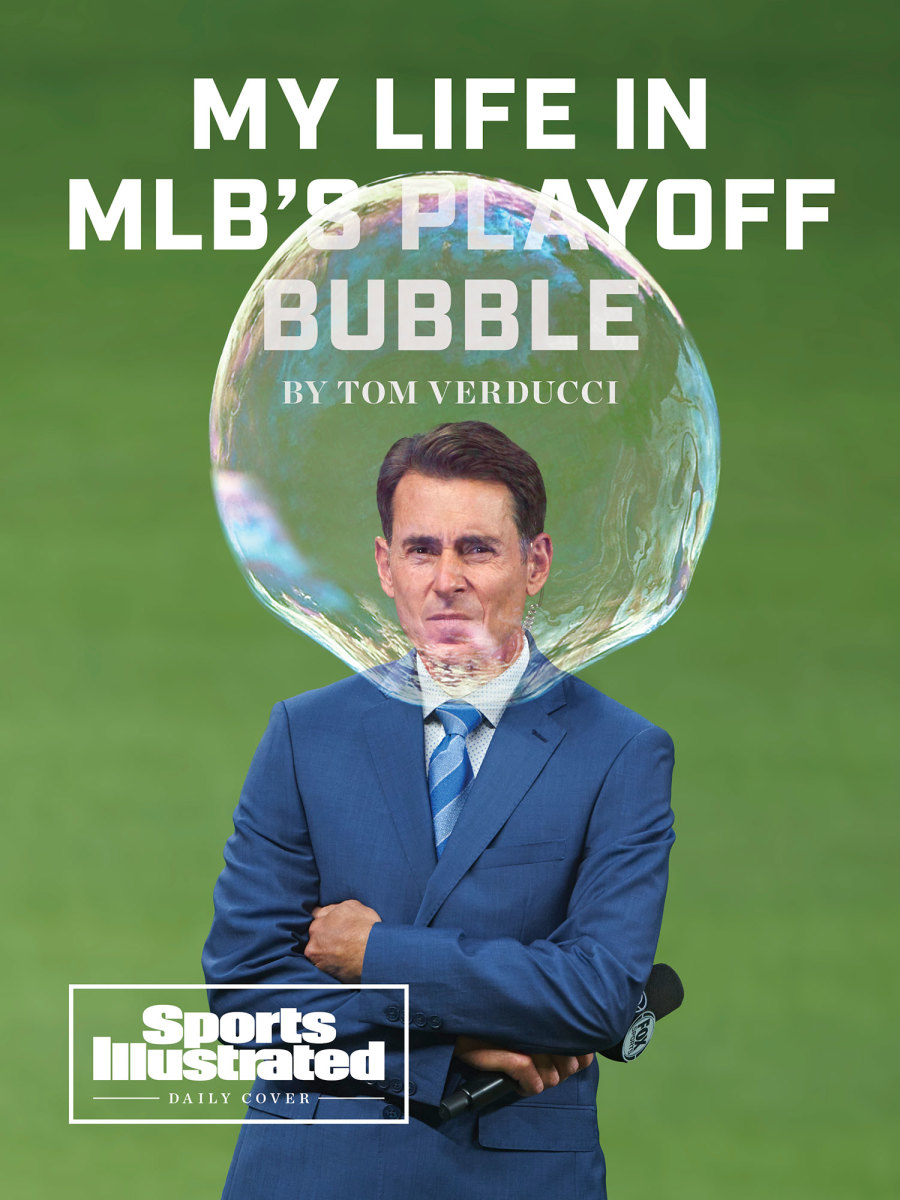
From daily COVID-19 tests, to grab-and-go meals, to transportation, to an in-house barber, to a movie theater for players’ children, to the killer laundry (lightning fast and exquisite folds), Major League Baseball did the bubble just about perfectly. Baseball players can be chronic complainers, given the usual grind and travel over the usual long season and its inevitable snafus. But inside the bubble there is nary of peep of complaint.
Many players and team officials have family with them inside the bubble. You see players and their wives pushing strollers or splashing in the pool with their kids. For those of us without family, however, the bubble is, as Roger Waters once wrote, comfortably numb. The isolation, lack of freedom and lack of emotional nourishment from loved ones dulls the soul over a long month.
That’s not a complaint; it is simply the residue of the extraordinary measures it takes to stage a postseason through a global pandemic.
If you were pitching a movie on life inside the bubble, you might sell it as Groundhog Day meets Survivor. So far it has been a success for me. I have managed not to break any lamps hitting golf balls in my room, not to go completely insane without use of a gym, not to forget any of the daily morning spit COVID-19 tests after long nights, and not to get thrown out of the bubble, though I came very close just two games into it.
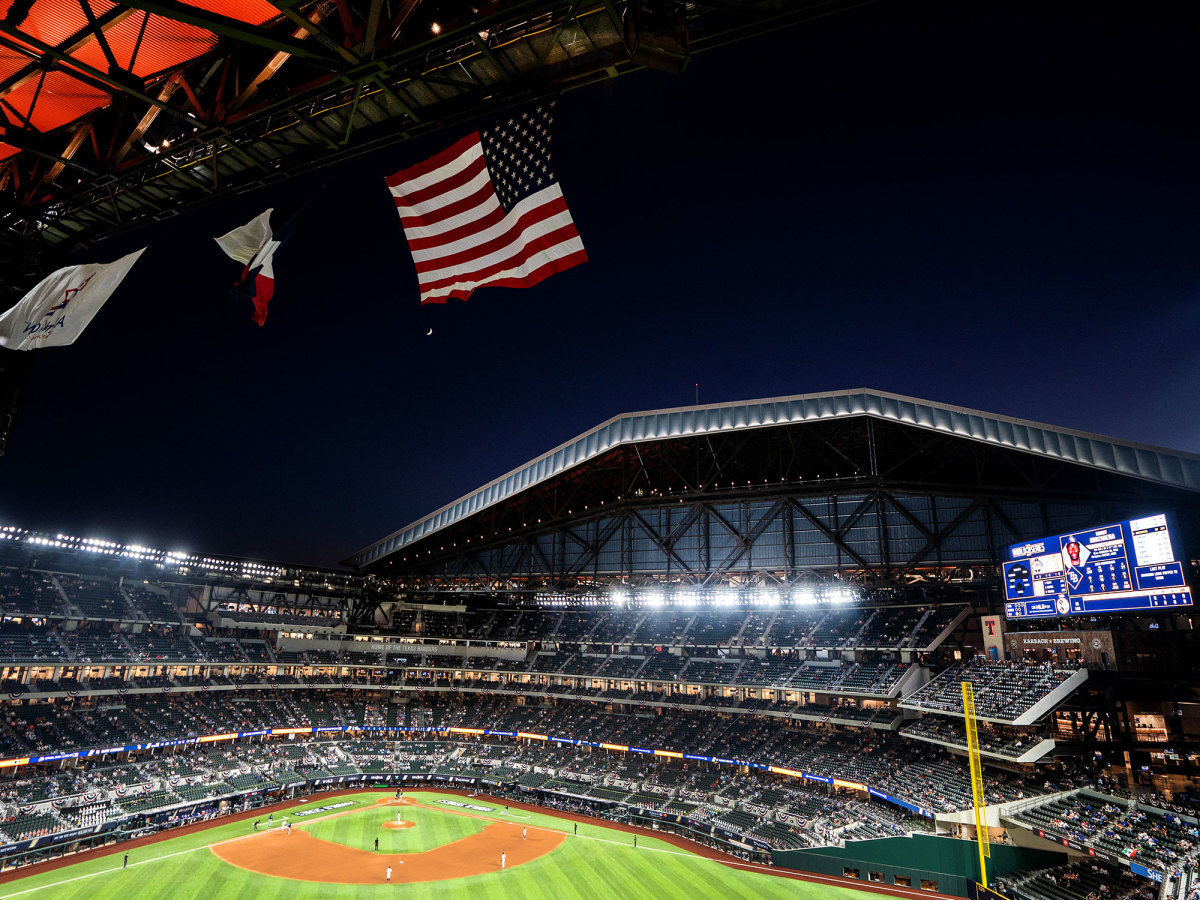
***
Even the ugliness of commerce and concrete crud along southbound I-45 heading toward Houston looks like Eden after you’ve been confined to a hotel room for eight days. Outside the window of a bus taking me to Minute Maid Park for a Division Series workout day (50 seats, four people), a string of man’s contributions to vice and commercialism slips by one after another, like overripe fruit spinning in the window of a slot machine. Pick your poison from among the strip clubs, strip malls and bail bond outfits. (For the adventurous types, there is James Bond Bail Bonds; alas, with no Aston Martin parked out front.)
The newness of life (even this kind), people, mobility, and the incredible brightness of the day bowled me over. The only time I left my room for eight days was for intake testing. Luckily, the testing room was in another building from where my room was located. I came to look forward to my three-minute walk between buildings the way an adventurist craves scaling the Seven Summits.
I started the quarantine Sept. 27. It wasn’t bad. I did have fresh air, thanks to sliding glass doors that opened to a small balcony. Thankfully, my request for a treadmill in my room was granted. I had a contact with the outside world via Melissa, the MVP of the postseason as far as I’m concerned, a production assistant who could fulfill requests for provisions to be delivered.
I was given a “Secure Zone Health and Safety Protocols” six-minute video to watch that ominously detailed the rules of being in the Secure Zone and the penalties for violating them. Those found to be “repeatedly or flagrantly” in violation of the rules are booted out. Players who violate the rules are ineligible for any postseason money.
The main rules are simple: wear a mask at all times outside your room, maintain proper social distancing, do not leave the hotel property for any reason other than taking a secure bus to the ballpark, do not gather for meals indoors, and do not order any food to be delivered from outside the hotel.
There are three security levels in the postseason, the first two of which are in the bubble. Tier 1 includes on-field club personnel, such as players, managers, coaches, trainers and umpires. Tier 2 includes family members and a limited number of broadcast rights-holder employees assigned to working on the field (i.e., me), not in the booth. Tier 3, which is outside the bubble, includes grounds crew and all other broadcasters and media members. Those of us in Tier 2 never see or come near those in Tier 3. The ballpark includes separate entrances, elevators and hallways for Tier 2 and 3 members. We had an hour-long conference call just to define field access at the ballpark so that no “contamination” occurred between Tier 2 and 3 members.
Once my eight-day quarantine ended, I looked forward to perhaps one day getting on the hotel golf course. I heard the players had insisted on having access to golf while negotiating with MLB on the bubble arrangements. The first tee was right outside my window.
Except I was told the course was outside the Secure Zone. This happened in the Irving bubble, too. No golf. I wasn’t the only disappointed one.
“We were told we would have access to golf,” said one Dodger. “That was part of the deal. I don’t know what happened. But it would have been nice to get out there on a day off.”
For a month, in both Houston and Irving, I have looked from my hotel room window at sparsely populated, gorgeous golf courses just a seven-iron away, knowing that I am barred from setting foot there.
Odysseus tied himself to the mast to resist the call of the Sirens. Now I know how the poor dude felt.
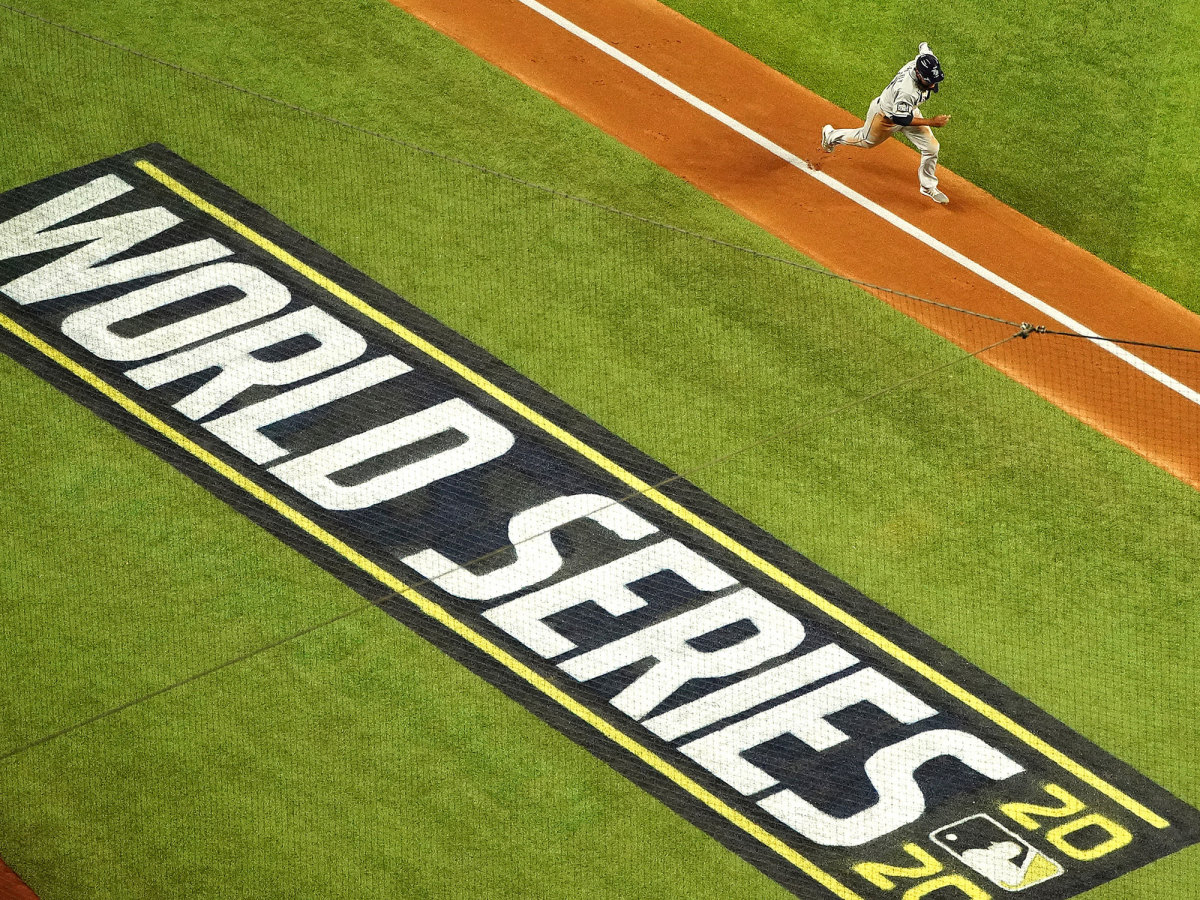
***
One day, one of the Braves players at the Houston bubble took a golf ball and a putter to a practice green and started rolling putts. Nobody was around. He was chased off and chastised by MLB security as fast as a 12 on a Stimpmeter.
In the Irving bubble, the Dodgers stay in villas close to the 18th green of the golf course. Late one afternoon a couple of players began to chip a ball or two on to the green. The scofflaws were quickly shut down by security agents.
One day a Tier 2 media member decided to go for a walk along the golf course cart path. He had barely begun when a security agent chased him down in a golf cart and ordered him off the trail. “I swear they must have cameras all over the place here,” the accosted walker said.
When the postseason began, on-site personnel told me I could drop my mask while conducting socially distant on-camera interviews so I could be heard. But after two games, a memo was sent to me in very officious language threatening me with banishment if I continued to do so.
Before the NLCS began, a rumor circulated among the Braves that the Dodgers were importing food to the bubble. Word was that otherwise contraband food was allowed in as long as orders served 10 or more people. Atlanta first baseman Freddie Freeman asked Braves personnel to investigate. Freeman was learning to live without his daily cup of Starbucks coffee, even though a Starbucks was located right next to the hotel.
“If that’s the case, I’ll order for 10,” he said.
His answer came the next day. MLB had contracted with only a couple of restaurants that met strict health and safety protocols to provide another food option for players.
Yes, the safeguards in the bubble are strict, as they must be. The gym is off limits. (Here in Irving I have no in-room treadmill. The hotel said it won’t fit through the doorway and the electrical boxes are not equipped to power one.)
It took a week of negotiations to open up a running “path” in the Irving bubble. It is a quarter-mile concrete path in the shape of a narrow paper clip. Running these narrow, small laps, you must wear your mask and your large plastic credential that hangs from a lanyard around your neck.
The security is impressive. It is reassuring to see how seriously everybody takes the security of the bubble. MLB has a billion dollars just in television money riding on completing the postseason. Every morning I passed by a security agent who made sure to eyeball my credential, on the lookout for illicit runners.
***
With no golf access, I turned my Houston room into a putting green. I rolled enough putts to nail the break in the swirl pattern in the carpet. In Irving, after hundreds of putts, I went one better and turned my room into a driving range. Melissa the MVP tracked down Wiffle golf balls. I smashed wedges from one side of the room into the facing wall (safely).
After three weeks in the bubble, I heard a rumor: MLB might get access to a portion of the driving range for a small window of time. My sources confirmed it was true. It took weeks of negotiations, but somebody pulled it off. I was told to contact a certain MLB official, who told me to meet an MLB Resident Security Agent in the hotel lobby the next morning. It sounded very clandestine, like something from Bridge of Spies. The agent, a retired police detective, escorted me around the extreme edge of the hotel property to the hitting mats at the edge of the driving range, far from club members. He waited there as I hit balls. He escorted me back, taking the same outer route.
You have to understand what the postseason schedule is like to know the thrill of such a 30-minute diversion. Days start at 7 a.m. compiling notes for the game that night. The daily saliva sample is at 9 a.m. On the paper clip track at 9:30. Three more hours of game prep. Maybe write and record an essay for the pregame show. Record a video blog. Bus to the ballpark five hours before first pitch. Pregame interviews and reporting on and off camera. Four-hour game. Half-hour bus ride back to hotel. Write a story until 2 or 3 a.m. Grab a few hours of sleep. Up at 7 a.m. Cue “I Got You Babe.” Do it again and again.
One day I ran into two umpires at the concierge desk. The concierge was fetching a set of golf clubs for them so they could hit balls at the range.
“It feels like a jailbreak,” one of them told me. “I feel like I’m breaking out of jail and into the outside world.”
I nodded. I knew just how he felt. Shawshank meets the Four Seasons.
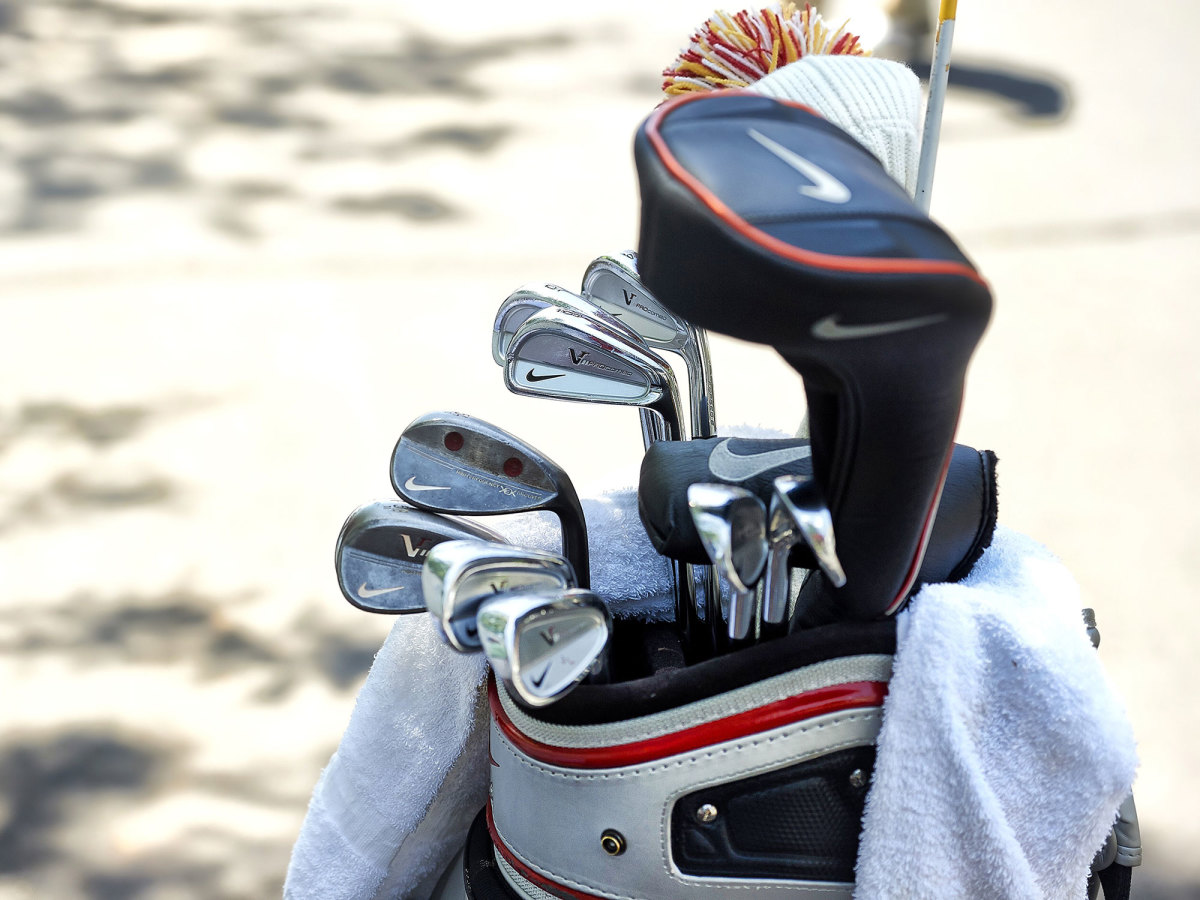
***
The World Series is better in a bubble, at least at ground level. That summer travel ball feel continues at the ballpark. Players bond after so much time together. For safety reasons they don’t get to the ballpark nearly as early as they do in normal times, when they hang out under fluorescent lighting for hours, scarfing food, lounging in front of TVs, and hitting, hitting and doing more hitting in the cages.
“It’s too much,” Braves manager Brian Snitker said. “Some of these guys come in just for the food. I tell ‘em, ‘Go get a pitching wedge or a fishin’ pole.’ Get a hobby. This has been good for them.”
The dugouts are packed. Pitchers stay on the bench after their half inning of work. Guys talk constantly during the game. “How did he pitch you?” “What did you think of the tilt on his slider?” “Are they seeing my curveball out of the hand?”
In-game video rooms have been closed this year because of restrictions on indoor gatherings, and the games and the players are better for it. They are watching the game, not video. They are pulling for teammates. The Braves are the best team I saw at this. Their baseball discussions in the dugout are constant. This is how everyone grew up playing baseball as amateurs: figure it out without electronic help. Ask a teammate. Many players, though, do not like the restriction.
“Young players like me grew up [in the majors] with it,” Dodgers outfielder Cody Bellinger said. “We’ve been used to it. I like to go back and look between at-bats to see if I have to make an adjustment. ‘Where were my hands set up?’ Things like that. For young players, it’s all we’ve known.”
Players’ families are in field-level boxes down the foul lines. Players routinely stop by just before first pitch to say hello, pose for pictures or blow a kiss through the string fence that separates them. This physical closeness between player and family also makes the World Series more intimate—amateurish in the best sense of the word. Braves pitcher Bryse Wilson was given a cross pendant from his girlfriend just before his NLCS start. Rays outfielder Kevin Kiermaier stopped by to see his wife and toddler son minutes before Game 2. When Daddy had to leave for work, little Karter Kiermaier started bawling.
“Ah, man, he’s breaking my heart,” said a misty-eyed Kevin as he ran toward the Rays’ dugout.
Globe Life Field is the perfect venue for a World Series in a pandemic. The park is more beautiful in person than it is on television. (The Rangers really ought to look into improving the camera sight lines and creating a more appealing backstop visual.) Players have raved without dissent about how it looks and plays.
Seeing fans back in the park remind us how important they are to the game. The 11,000 or so people in the ballpark bring a needed, raw energy. I almost forgot about the joy and madness caused by the simple act of a foul ball being hit toward people in the stands. It is good to see again.
The Dodgers have spent three weeks on the home side of Globe Life Field. The home facilities top what they have at Dodger Stadium. The footprint of the home clubhouse, which includes food rooms, sleep rooms, training rooms, cages and such, takes up an entire acre. There is a two-story gym, a pizza oven, an auditorium for pregame meetings, and a barbershop.
“In this new playoff format, the team with the best record doesn’t get much of an advantage over other teams,” said one Dodger. “But as it turned out, being on this side all the time, we feel like that’s been an advantage for us.”
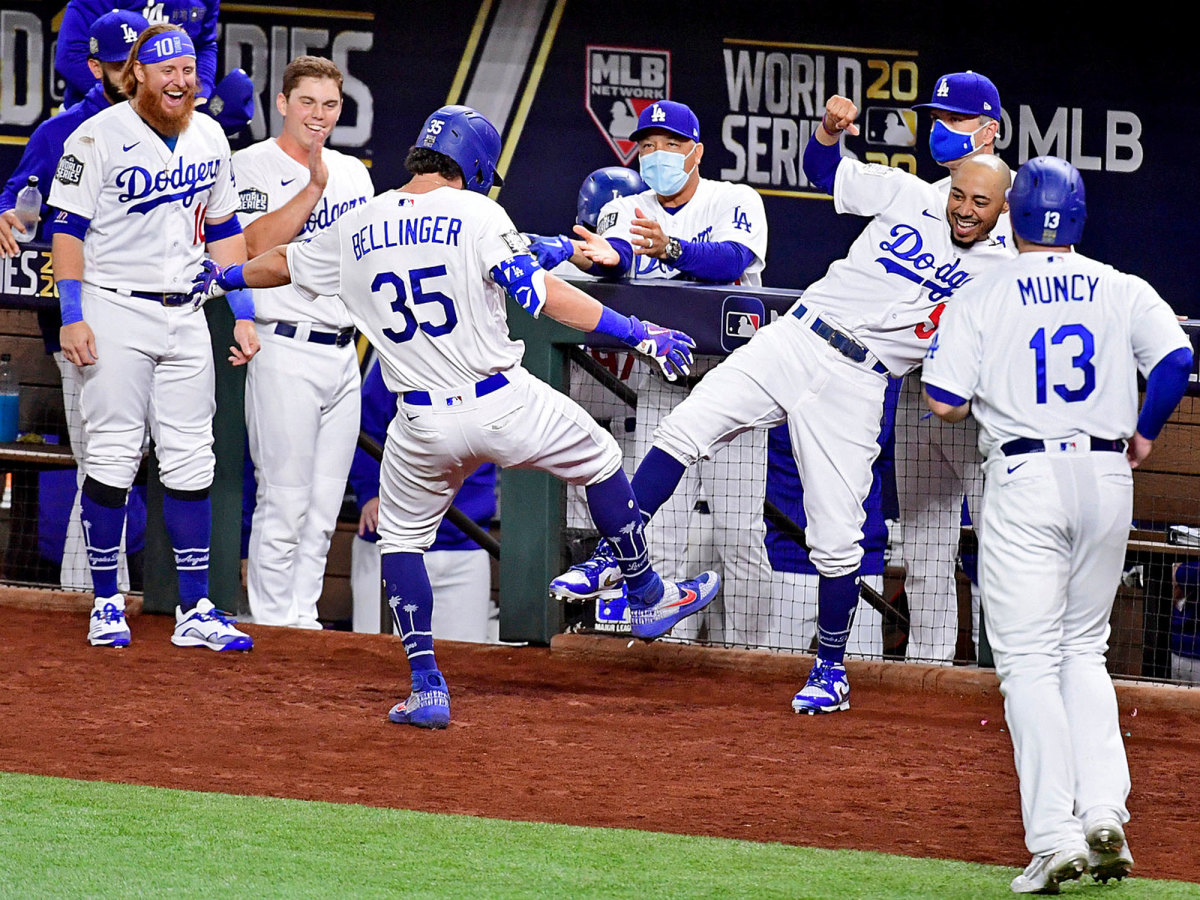
***
The pillars of staying safe through this pandemic are to wear a mask, maintain proper social distancing and wash your hands. Layer daily, rapid testing on top of those, as MLB has done, and you have a template for moving a business forward as best you can in the uncertain days of a pandemic.
There was a time three months ago when commissioner Rob Manfred was probably one more major outbreak away from pulling the plug on the season. The Marlins and Cardinals were hit hard by COVID-19 infections. People in the game were nervous that we might never get to a World Series.
Baseball did make it here through an extraordinary effort by the players. Maybe, as Marlins CEO Derek Jeter said, they let their guard down early. But the players showed such discipline and resolve that only two scheduled games were not played. They have carried such commitment through the postseason, where MLB has brought an impressive thoroughness and seriousness to creating the safest bubble possible. It is a logistical success story.
Even shortened, though, this season has been a grind. You see it on the faces of teams when they are eliminated. You saw it in the teary-eyed response of manager Dave Roberts to winning the NL pennant. There is an emotional toll to having freedom curtailed and staying alert every day to limit your chances of exposure to a virus that has killed 225,000 Americans. A baseball season is not typically played with an awareness of survival 24/7.
Be it the Dodgers or Rays, this champion will be a true champion, a word that derives from Medieval Latin not for a winner but for a fighter, a combatant. The bubble has its creature comforts. But even the thrill of exquisitely folded laundry begins to wane against the weight of weeks of isolation. I am ready for the best kind of bubble. The bubble called home.
